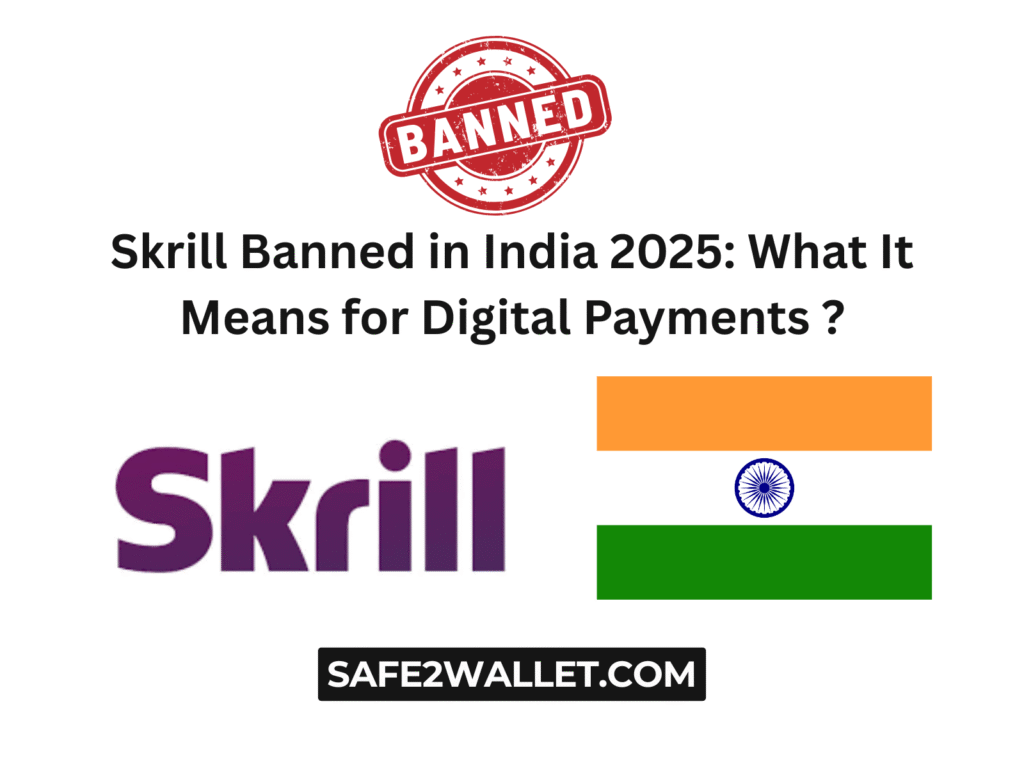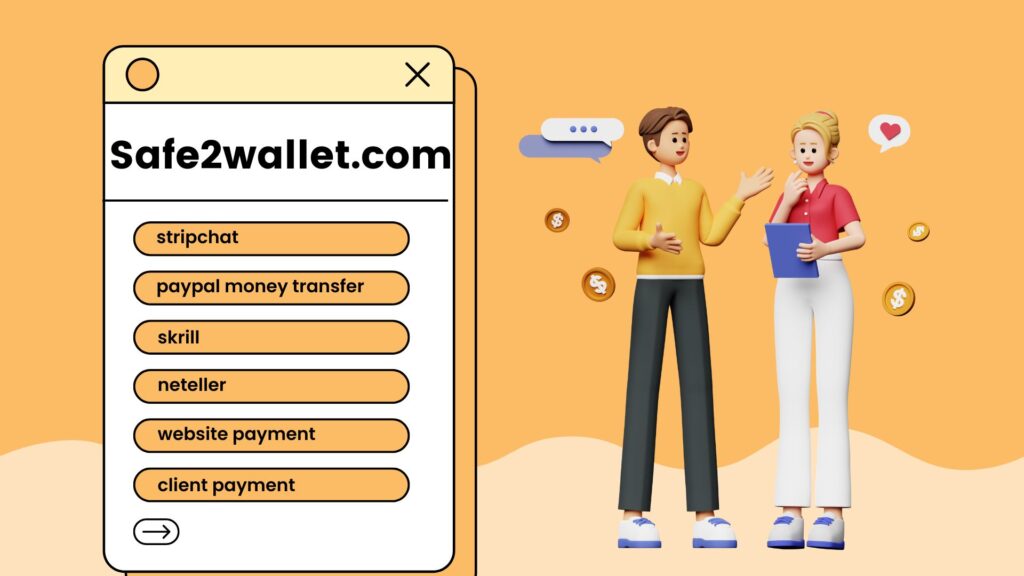Skrill Banned in India 2025 !

Skrill Banned in India 2025: What It Means for Digital Payments ?
Introduction
By 2025 India was the focus of attention when they blocked Skrill one of the top internet-based payment services. Skrill is known for its international access and easy transactions is a popular option for a lot of users in India for many years. However, the decision to end Skrill within India has made many wonder what the next steps for digital payment across the globe. What will this mean for both businesses and consumers and how will it affect the electronic payment system?
What Led to Skrill Banned in India?
The restriction on Skrill Bannedin India wasn’t a one-time event. A variety of factors contributed to this decision. There have been increasing concerns about how secure digital transactions are as well as the protection of personal data. The Indian government has been in the process of regulating the industry of digital payments has stepped up its enforcement on payment platforms that do not conform to local financial and regulation on data protection. Skrill Bannedand other international payment systems have been scrutinized due to their inability to conform to the latest regulations.
Another reason behind the ban is concerns regarding money laundering and abuse of digital payment systems to carry out illicit actions. India has strict laws aimed to stop financial crimes and the non-compliance of international payment services led to their decline. In the context of India’s overall efforts to provide transparency and accountability to this digital world, authorities made the hard decision to block Skrill to operate in India.
Impact on Indian Consumers
For a lot of people from India, Skrill Banned was an convenient and safe method to transfer funds, make international transactions as well as participate in online games or invest in cryptocurrency. With its user-friendly interface and widespread acceptance, it was an essential option for a variety of digital transactions.
But, due to its ban the existing customers are in a state of confusion as they search for alternatives. The ban could cause disruption to ongoing transactions and international transfer. Anyone who uses Skrill to send or receive funds across borders are directly hit. Additionally, those typically making payments for services like online gaming or investing will have to be able to adjust quickly to new platforms.
If you are looking to make international payments Alternatives such as PayPal, Neteller, or local Indian options like Razorpay may gain in popularity. But the issue for the consumer is that these solutions may not provide the same quality of convenience, affordable rates and ease of use like Skrill offers.
Skrill Banned Role in India’s Digital Payment Landscape
Skrill has created a niche in India through its speedy and simple access to worldwide payments, which made it a desirable option for people who need to manage foreign currencies. It was particularly well-liked by entrepreneurs, freelancers, and small-scale companies that required access to markets across the world without the hassle of conventional banking system.
The ban is significant since it signifies a change in the approach of India towards foreign payment services. Even though Indian digital payment options such as Paytm, PhonePe, and Google Pay have gained popularity on the Indian market but many Indian users who frequently transact in foreign currencies are likely to experience the consequences.
There are plenty of options for Indian customers. PayPal is operating in India for a long time is likely to see an increase in usage. Other players, such as Wise (formerly TransferWise), Neteller and even cryptocurrency-based companies could profit from this existing gap on the marketplace.

Skrill Banned Impact on Businesses and E-commerce
For companies, especially those that are involved in e-commerce or offering services that are international, Skrill Banned has been a preferred choice for transactions that cross borders. If it was a small company selling goods abroad or an online store that accepts payments from customers abroad, Skrill offered a fast and secure way to handle transactions.
In the wake of the ban the businesses will need to look for alternative options to Skrill. Although this may not be a major issue for larger enterprises with a system for several payments, small companies may be impacted. They might have to switch into local processors, or investigate alternative payment systems that comply with the Indian financial regulations.
Global Reactions to the Skrill Banned
Skrill Banned/Skrill’s denial in India has caused a stir around the world, particularly for consumers and businesses who depend on its services. International experts in finance have raised concerns about the possibility of impact on ripples, suggesting that other payment services could receive similar scrutiny and sanctions if they fail to comply with local laws.
A few multinational businesses that relied on Skrill in order to pay Indian freelancers or suppliers must find alternative payment methods fast. Experts in financial services are forecasting that there will be a change in the payments ecosystem, with the global as well as Indian players being required to adapt to India’s stricter regulatory system.
Skrill Banned Legal and Regulatory Implications
The decision of India to stop Skrill could set the tone for other payment systems in the world. The government’s position on digital payment regulation is unambiguous the law of the country is not a matter of negotiation. As more international payment systems are scrutinized, other players might be required to comply to India’s strict rules or face bans of similar nature.
This change in regulations is impacting how Indian businesses view digital payments. A lot of local businesses that relied on global platforms such as Skrill are now experimenting with local solutions that are more compatible to Indian laws. These changes will stimulate more innovation in the Indian fintech industry as local companies rise to meet the demands of consumers.
Skrill Banned The Future of Digital Payments in India
The Indian digital payments landscape is rapidly changing as the use of mobile wallets UPI (Unified Payments Interface) and digital banking becoming more popular. As more payment services come under the sway of government regulations and oversight, we could see an increase in the use of local products that have been more in tune to the financial system of India.
Fintech’s role in the Indian economy is set to increase as more companies, small and large, switching towards digital payments to support their business. Although the prohibition for Skrill is a blow to customers and businesses that rely to international exchanges, the ban underscores the importance of secure, well-regulated financial services. As India moves towards the electronic economy, it could see more rules, but also greater opportunities for growth and innovation.
Conclusion
The suspension of Skrill within India is an alarm for customers and businesses across the country. Although the immediate effect may cause some inconveniences however, it may also open the way for more robust, secure payment systems that are in line with India’s regulations. Digital payment in India appears promising, but it will require a change to international and local payment systems.
FAQs
The Indian government continues to enact stricter regulations to ensure that the digital payment systems meet the anti-money laundering and security standards.
Is Skrill forever prohibited from India?
It is true that Skrill has been banned for life in India for non-compliance to local laws.
What is the process for businesses to move away from Skrill?
Companies will have to look at alternatives such as PayPal, Razorpay, or local payment options.
Are there legal options for international payment?
Yes, platforms such as PayPal, Wise, and Neteller are legal for international transactions.
what does that mean to the digital payment for India?
The ban could result in greater local innovation in the fintech industry and a greater emphasis on the compliance of Indian laws.
How can the government make sure that digital payments are safe?












